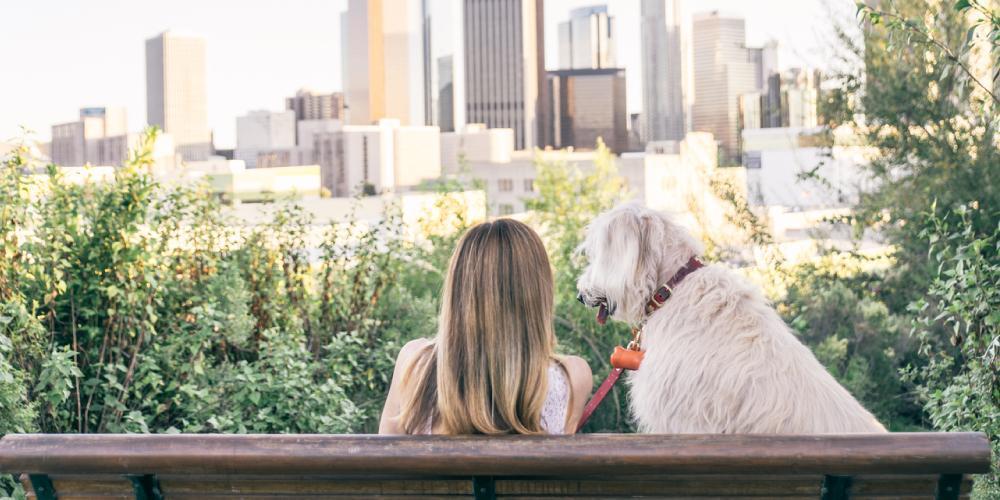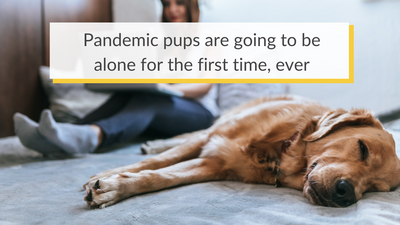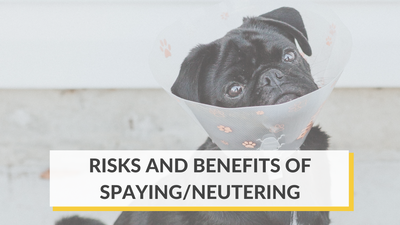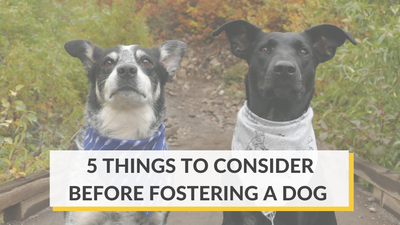You and your dog do everything together — from enjoying long walks on sunny days and playing in the park to curling up together on the couch when the weather isn't so cooperative — you're two peas in a pod. You can't imagine life without the friendly panting, tail-wagging and begging of your best friend and baby, so it's hard to picture spending a vacation without him or her. Who will feed her? Will your caregiver give him enough cuddles? Is your dog better off at home, out in the backyard, boarded at a kennel or left with a friend or family member?
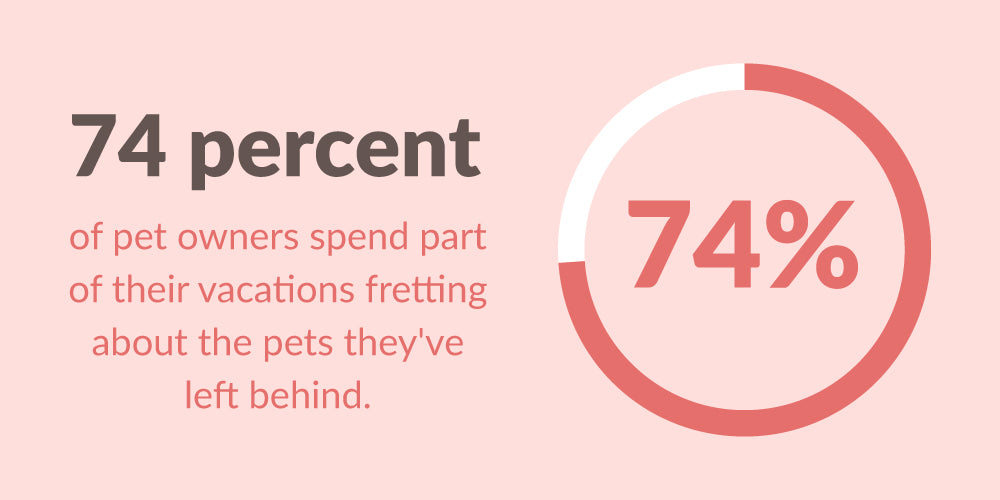
If it's your first time leaving your furbaby while you go away on vacation, you're probably worried about how to ease the separation anxiety, keep your dog as happy as possible, and provide the best possible conditions while you're away. Even worse, you may continue to worry about your dog during your vacation, which could make it difficult for you to relax and enjoy your time away.
If you're guilty or anxious about going away without your furbaby, you're not alone — according to a State of U.S. Pet Travel study, 74 percent of pet owners spend part of their vacations fretting about the pets they've left behind, and 24 percent admit to worrying during the entirety of the trip. Owners tend to fear for both the mental and physical health of their dogs while they're gone, with 20 percent worrying the dogs might injure themselves or not eat enough, and 60 percent worrying whether being alone will cause long-term anxiety issues.
No matter how much you love your furbaby, spending your vacation stressing over him or her will only wear you out, and it certainly won't help your dog from afar. Instead, prepare everything ahead of time to make sure the time you spend apart is the best it can be for both of you.
Not sure you know the right way to leave your dog for the first time? Don't worry — from finding the right caregiver to planning the perfect ways to keep your baby's tail wagging when you're gone, here's how to be an awesome pawrent and enjoy your trip.
Leaving Your Dog for Up to Two Days
If your vacation is a day trip to an exciting location, or a weekend getaway to keep you sane from the work week, leaving your dog at home will be an easier task than you think. Since you'll only be out of the house for a short time, the danger of separation anxiety is a lot less prominent for both you and your furbaby. After all, you're probably used to being separated during the day while you're at work, and even if you spend more time together than the average pup and pawrent, the absence will pass in a flash. Trips this short are also easy to prepare for when it comes to your dog's care.
Wondering where to start? It's simple. This guide will help you with all your canine needs for the time you're away. Here are some common concerns and how to address them.
-
Home vs. Caregiver:
Because you want someone to look after your pup every hour of the day, it's tempting to consider recruiting a friend or family member to keep him or her in their home while you're gone — or even to board with a kennel. You might feel most at ease knowing your dog is safe, even if that means an unfamiliar environment. Your dog will likely be just fine staying in your home while you're gone, so depending on how much of the two days you will spend away from home, you can always ask a friend, neighbor or family member to stay over or stop by a few times to spend time with, feed, and check on your dog.
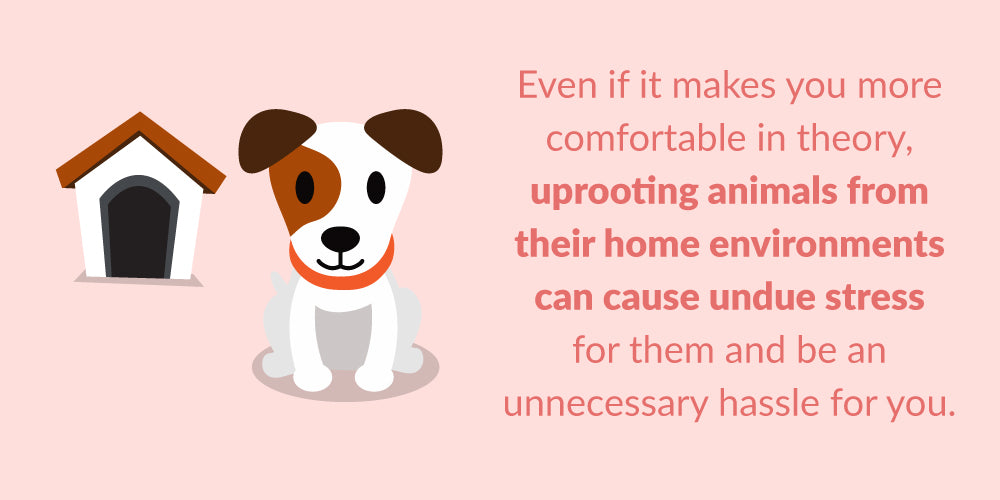
-
Food and Comfort:
Recruit a friend to keep him company or decide she's fine on her own for the day, it's important to make sure to provide for your dog's basic needs. Leave out extra water and food so hunger won't be an issue, or if you're worried about that becoming a mess, consider installing an automatic food and water dispenser that will portion out just the right servings at the right times. To keep your furbaby happy as well as healthy, make sure you provide some comfort items. For example, you can leave his or her bed in an easily accessible spot and put out plenty of safe toys to play with.
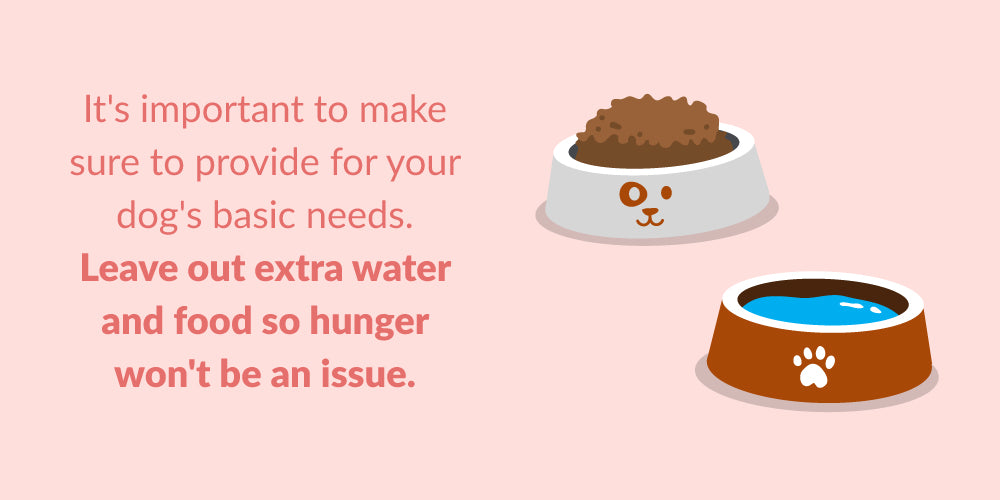
Leaving Your Dog for Three Days
Planning a long weekend for a holiday or just a much-needed escape? Whether you're getting away to the nearest beach, finally tackling that tourist attraction you've never made it to, or cozying up to a campfire in the mountains, you should enjoy your time away while resting assured your dog is okay. Preparing to leave your pup during a three-day trip won't be too different from leaving for a day or two.

You'll find it easiest to recruit someone to stop in a couple times a day to check on food, water, offer plenty of love and provide potty breaks. If you can't find a friend willing to watch your dog occasionally, consider hiring a trained, certified pet sitter.
Leaving Your Dog for a Week or Longer
When you know you'll be out of the house for a week or more, dog care becomes a little more complicated. You'll need someone to look after your dog every day, providing him or her with the necessary food, water, attention and affection during your absence. A week is a long time when it comes to attending to your dog's needs, but it's still short enough that packing up everything your dog needs and transferring him or her to another house or a boarding kennel can be an unnecessary hassle. To make preparations easier for both you and your dog, plan to have a friend, family member or dog sitter care for your furbaby in the comfort of your own home. Here's how to choose the right person to dog-sit and how to make sure everything is set for the week.
-
Choosing a Carer:
When you're picking someone to care for your pup, make sure it's someone you trust. This means a reliable, responsible friend or family member you know can dedicate the proper amount of time to looking after your furbaby. If you have parents or siblings who live nearby, they're great candidates for carers because they know you, your dog and how important the job is. A neighbor is also a great option because they're always nearby and can keep an eye on both your house and your dog around the clock without much inconvenience.
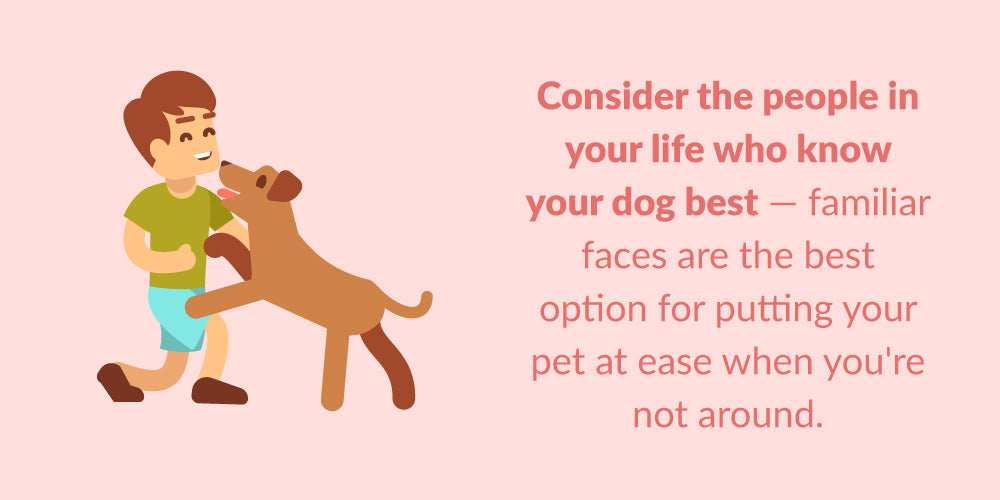
To help you choose, consider the people in your life who know your dog best — familiar faces are the best option for putting your pet at ease when you're not around. To make matters easier, ask your carer if he or she can stay in your house while you're away — that way, you have a built-in sitter to provide your dog with comfort and affection, in addition to food. If no one you know is willing to watch, search for a certified pet sitter to hire. It may cost more, but you'll know your baby is in good hands.
-
Preparing Your Home:
Whether your friend, neighbor, family member or professional pet sitter is staying in your home or stopping by every day, it's your job to make sure you provide everything they need to take care of your dog. Stock up on food, set up the house the way you'd like it to stay — with any specific doors closed or areas penned off — and leave everything your carer needs in an open, specific area like the table or counter. Set out your dog's leashes, harnesses, collars, doggy bags, treats, extra food and medication for easy access, and make sure you also provide cleaning supplies like doggy pads, deodorizers and stain removers. Double-check that your dog's tags are up-to-date and your registration, if required, is valid.
3. Instructing Your Carer:
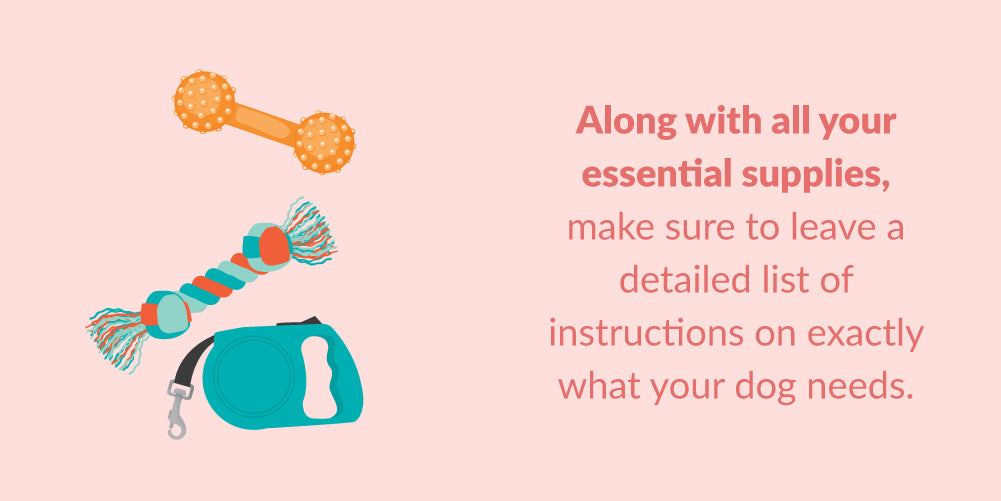
Along with all your essential supplies, make sure to leave a detailed list of instructions on exactly what your dog needs. Tell your carer how to feed your dog, how often to change the water, when to give treats, when and how frequently to take him or her out to go potty, whether or not the dog needs a leash or security collar in your yard, where to walk and socialize him or her and any other routine staples.
If your dog takes meds, make sure to be specific about how and when to give them, and be clear about explaining your dog's behavior. Every pup has a different personality — tell your sitter exactly what your dog likes for food, playing and cuddles, explain any triggers that might upset him or her and make a note of when or where your dog is territorial. You can also give suggestions for handling your dog. Make a list of any allergies and leave a contact number for your vet, along with your own contact information.
Leaving Your Dog for a Month, or Longer
Sometimes trips can take us away for longer, and leaving your dog in the right care during these situations can be even more stressful. Whether you need to go away for a family emergency, a business trip or a long-term vacation, you need to make sure your furbaby is in good hands until you return. Here are some options when leaving your dog for a month.
-
Leave Your Dog with Family or Friends:
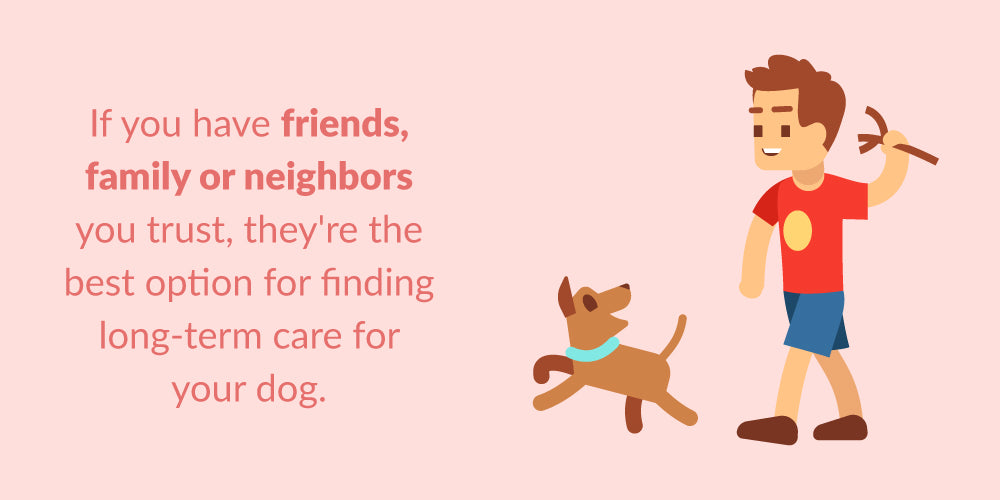
If you have friends, family or neighbors you trust, they're the best option for finding long-term care for your dog. This time, it makes more sense for your dog to stay in your sitter's home because of the length of time you'll be away. Rather than picking anyone who's up for the task, narrow your search to people who really know you and your pup. This isn't just pet-sitting for a week — it's becoming a foster parent for a significant amount of time, and being in the care of someone you already see frequently will help put your dog especially at ease. Plus, you can be sure that person has your best interests at heart.
You should also consider the schedule and home conditions of the person your pup will be staying with. If they have a crazy routine and aren't often at home, have kids or other pets your dog might not be comfortable with or live in a significantly smaller or less pet-friendly setting, this could be a problem. Make sure your sitter knows what he or she is getting into and is fully equipped for handling a dog full-time. If you do need to leave your furbaby with a family with children or other pets, introduce them beforehand to make sure everyone is comfortable with each other when the time comes.
-
Leave Your Dog With a Professional Pet Sitter:
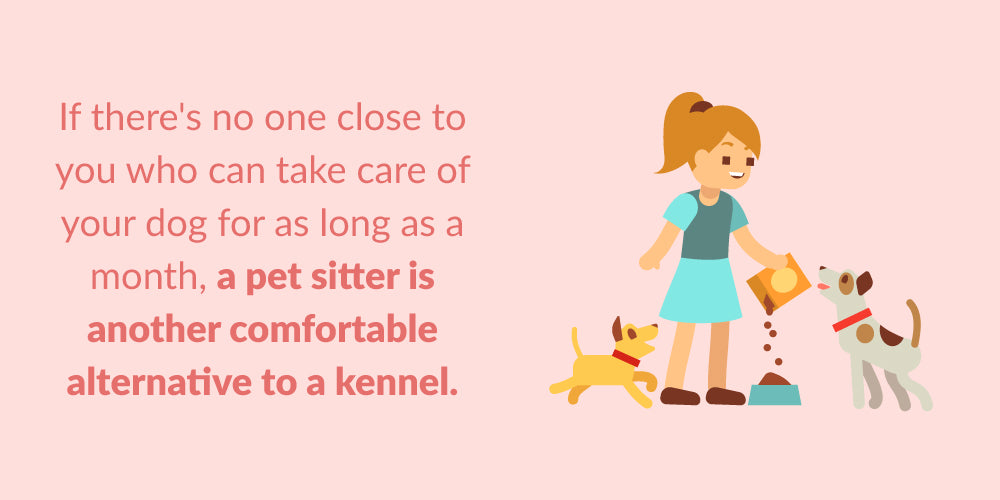
If there's no one close to you who can take care of your dog for as long as a month, a pet sitter is another comfortable alternative to a kennel. You can find a sitter by searching professional pet care websites, house care sites or classifieds — or ask your veterinarian for professional recommendations. Make sure the sitter you choose is certified, and you spend some time with him or her before you leave, so your dog can become accustomed to the person. Whether you leave your pup with the pet sitter or the sitter stays in your house is up to you and the professional. While your friends and family might care for your dog without a fee or for a cheaper price, this option will cost you more, but it's worth it for quality care.
-
Board Your Dog at a Kennel:
If you have no other care options, you can always choose a veterinarian or boarding kennel to keep your furbaby long-term until you return. You might be less happy with this option, but don't worry — boarding kennels have experience caring for pets and will make sure your dog is safe and well cared for. Just make sure to do your research beforehand to determine which kennel is right for your baby. Here's what to consider:
- How much space is there? How big are the runs — or sleeping areas — where your dog will stay, and how much room is there for your pet to play, exercise and socialize? Will your dog have an individual or shared space to sleep? Depending on the size and personality of your pup, these are important factors to investigate before choosing a kennel. You should also check into the size of the kennel itself and how many dogs it holds at once.
- Will your pup have social time? Some kennels allow dogs into a common area for a specific amount of time each day to exercise and socialize with other animals. It's important your dog gets around three to five hours of playtime a day — otherwise, he or she will feel cooped up. On the other hand, if your dog is anxious or unsocial, you need to see whether the kennel will allow dogs to exercise in their own space or play with human workers instead. In addition, see if the kennel separates dogs by age and aggression levels to make sure the environment is safe for yours.
- How many carers will be around? It's important for your dog to receive the proper amount of attention, so look into how many people work at the kennel and when they will be around to interact with the animals. The larger the kennel and the more dogs they board, the more carers there should be. You should also check into their experience level and certifications to make sure your furbaby is in the best hands.
- What accommodations does the kennel have? Will your pup have a comfortable bed and toys to play with? How often will he or she eat? Make sure you understand the specific conditions you're leaving your dog in. If your baby is of an advanced age or has special medical needs, look into accommodations for those conditions, as well.
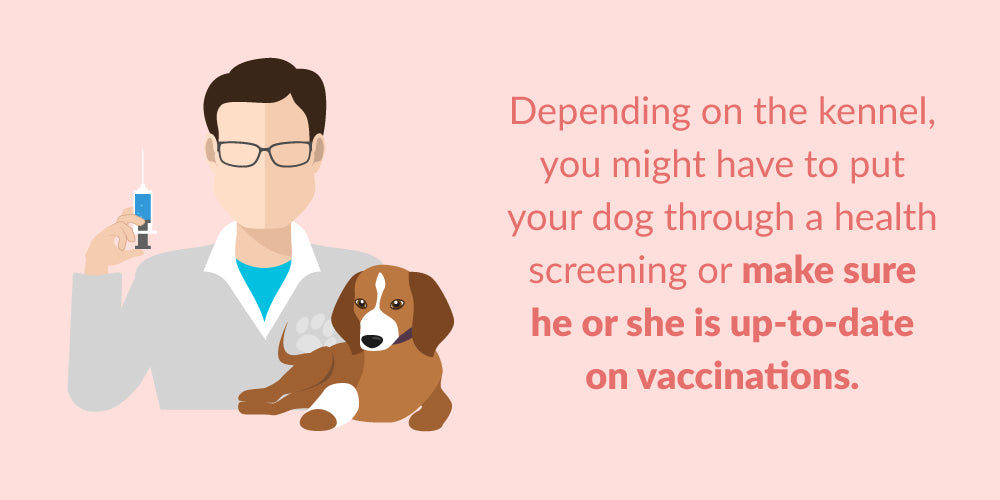
- What are the fees, requirements and inclusions? Check into the boarding fee per night and make sure you understand what the price includes. Does the fee cover food and additional services, or do you have to provide your own food and pay extra for grooming? Also, find out whether the kennel can pick up and drop off your dog, or you must do so yourself. Depending on the kennel, you might have to put your dog through a health screening or make sure he or she is up-to-date on vaccinations.
- What's the kennel's reputation? As a last point of research, look at the kennel's website and social media page for testimonials and customer reviews, or ask any friends who have boarded pets there before. Recommendations can give you a good idea of what kind of environment and experience your furbaby is in for.
-
Prepare a Month of Dog Supplies and Instructions:
No matter who is taking care of your dog while you're gone and where you're leaving him or her, make sure you've prepared everything your pup will need for the month. Here are the details you need to have organized ahead of time.
- Purchase the right amount of food and medication to last the month you're away.
- Work out the feeding routine with your caregiver, covering details like what to give your dog, when and how much.
- Make sure your dog sitter knows how often your dog goes potty — and where.
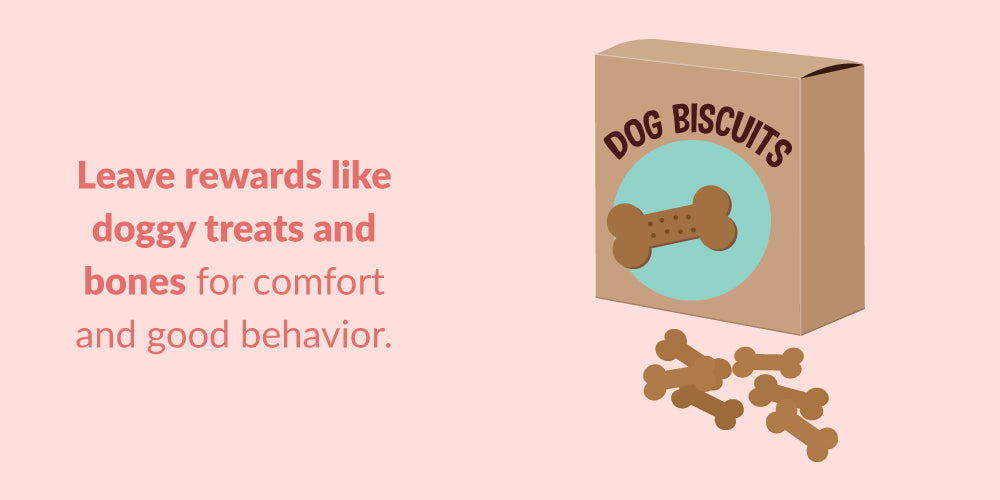
- Leave rewards like doggy treats and bones for comfort and good behavior.
- Leave your sitter with your dog's bed and toys, so your baby feels at home.
- Make a list of allergies and medication instructions.
- Alert your carer or kennel to any special needs, anxieties or personal traits they may experience with your dog.
- Apply flea treatments and get necessary vaccines before you leave.
- Provide contact details for yourself, a vet or another emergency contact.
Last Tips for Leaving Your Dog
It's really hard to leave your dog, but you'll see each other again soon! As long as you prepare everything before you set off on your trip, there's nothing to worry about. Here's some additional advice on how to make the distance easier when you leave your furbaby at home.
- Provide small comforts: You'll miss your pup, and he or she will miss you too! To keep yourself in your dog's heart, leave little reminders out at home — put your sweater in your dog's bed or leave out a pair of shoes so your furbaby can stay close to your scent until you return.
- Don't drag out the goodbye: Your dog is used to you leaving the house sometimes — don't make a big production of your departure this time, or you could risk making your pup anxious. Act confidently and casually when cuddling your dog before you leave, and both of you will feel more relaxed.
- Keep watch: If you're still concerned about parting from your baby and wish you could keep an eye out while you're gone, think about investing in a Furbo Dog Camera to stay in contact with the one you love. With features made especially for interacting with pups, Furbo is the only smart dog camera that lets you see, talk and give treats to your dog from anywhere. Be the best dog parent you can be by making sure neither of you is lonely while you're apart. Visit our website to check out all Furbo's features and order your pet camera today.
